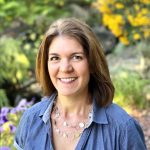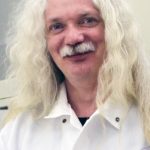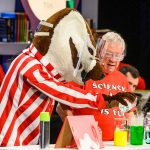Excellence in outreach recognized with Bassam Z. Shakhashiri Public Science Engagement Award
By Natasha Kassulke, natasha.kassulke@wisc.edu
A botany professor, Simon Gilroy, who studies how cotton and tomatoes grow in space and an outreach program manager, Haddie McLean, who is inspiring the next generation of scientists with The Wonders of Physics, have received the Bassam Z. Shakhashiri Public Science Engagement Award.
The award, in its second year, recognizes a UW–Madison faculty and academic staff member (one awarded to each category) who has shown excellence in engaging the public in their work in STEAM (Science, Technology, Engineering, Arts and Math) research.
The award is named for Bassam Z. Shakhashiri, emeritus professor of chemistry and the William T. Evjue Distinguished Chair for the Wisconsin Idea, in honor of his “Science is Fun” philosophy and long-term commitment to science education and public engagement. Shakhashiri joined the UW faculty in September of 1970 and retired in September 2021.
“The selection committees have named Professor Simon Gilroy(faculty awardee) and Haddie McLean (academic staff awardee) the 2024 recipients of the Bassam Shakhashiri Public Engagement in Science Awards and I join in offering my congratulations,” says Shakhashiri. “Science and society have what is essentially a social contract that enables great intellectual achievements but comes with mutual expectations of benefiting the human condition and protecting our Planet.”
Shakhashiri says, “We must nourish personal growth, cultivate creativity, and foster community appreciation of science. Science literacy enlightens and enables people to make informed choices, to be skeptical, and to reject shams, quackery, unproven conjecture, and to avoid being bamboozled into making foolish decisions where matters of science and technology are concerned. Science literacy is an attitude. Long live the Wisconsin Idea in the 21st Century.”
The Bassam Z. Shakhashiri Public Science Engagement Award is supported by the Wisconsin Alumni Research Foundation, the Morgridge Institute for Research and UW–Madison’s Office of the Vice Chancellor for Research.
“This year’s awardees have provided meaningful and interactive opportunities for the public with science and scientists, and in doing so, inspired new champions for science,” says Cynthia Czajkowski, interim vice chancellor for research. “Simon and Haddie have elevated the bar of outreach to our communities near and far, and made complex science concepts engaging and accessible.”
Gilroy has been a professor in the Department of Botany since 2007. His research uses cell and molecular approaches to explore how plants sense and respond to the world around them. He has investigated plant responses to stresses such as flooding, herbivory and even how plants sense being touched.
He also works extensively with NASA studying how plants react to the unique environment of growing on the International Space Station with recent experiments studying cotton and tomatoes in space.
The Gilroy lab engages with the public through regular participation in university-wide events for the general public such as the Science Expeditions, but also by joining the summer Space Camp at the Deke Slayton Museum, working with high school rocketry clubs, online mentoring of middle- and high-school students from around the United States, participating in recordings for PBS Wisconsin, the BBC and for Wildstar Films, and more.
Gilroy has given online talks to gardening societies around Wisconsin, discussed space biology with international audiences such as the “Seva Chakkara Samajam” orphanage in India, and with high-school students in Japan.
Recently, the Gilroy Lab supported a project in the Center for Education Research in the School of Education with developing a Mars colonization game. The team brought in members of the Boys and Girls Club of Dane County to learn both video game development and plant biology.
The lab has worked with the Wisconsin Institute for Discovery to develop a field trip called “Plants and Robots” that brings in middle- and high-school students to learn programming, engineering and construction of a biology imaging station.
The Gilroy lab also supports the Astrobotany.com site, which provides an entry point to encounter and explore plant biology in space. Last spring, Gilroy was interviewed by an artist in California who had developed an art piece around “celestial lettuce,”plants grown from a packet of “space seeds” given to the artist’s friend by the Gilroy Lab more than 5 years previously.
“The interview was to gain the background on the science of the seeds to present that alongside the art,” Gilroy’s nominator noted. “It illustrates the unexpected reach that science engagement efforts can have.”
McLean is a UW–Madison alumna with a Bachelor of Science in Atmospheric and Oceanic Sciences. She spent over 20 years working as a meteorologist at WISC-TV in Madison, where she honed her science communication skills in front of the camera every day and earned the trust of the public. She joined the Department of Physics in August 2021 as an Outreach Specialist to present The Wonders of Physics traveling show to schools and community groups around the state.
In October 2023, she was promoted to Outreach Program Manager. In her new role, McLean oversees all aspects of The Wonders of Physics outreach program, including the large annual show on campus every February, the traveling show, and securing funding to train undergraduates in the best practices of science communication to broad audiences and expand the program.
McLean’s nominator explains, “Importantly, she shares the science behind the demos — it’s not magic, it’s physics! One of the biggest improvements Haddie has made to The Wonders of Physics is the incorporation of leave-behind kits. These kits, developed with a colleague who is a former high school physics teacher, provide inquiry-based activities related to the show, which help reinforce concepts and allow for more active learning.”
McLean is constantly developing new demos and builds most of them herself with inexpensive items, proving that science outreach doesn’t have to be pricey to be effective. She also collaborates with department outreach staff to create new exhibits for the Ingersoll Physics Museum.
For the glass-themed 2022 WiSciFest, McLean created a “walking on broken glass” demo for a live performance on State Street. She broke and tumbled dozens of glass bottles, then filled a plastic tub with them. She first showed that the glass was sharp enough to pop a balloon, then she stepped into the tub. In a glass walk, the weight of your body is spread out over lots of pieces, which have the freedom to move. When you step on a single sliver of glass, your weight is concentrated over that one sharp point.
The audience for the Wonders of Physics shows is, as McLean says, “from pre-K to grey.” She adjusts the contents of her shows for any age and any level of familiarity with physics. She does this by relating physics to real-life concepts, showing her audience how they use physics every day and making sure that everyone knows they, too, can be a scientist if they observe and ask questions.
In addition to performance-based shows, Haddie has partnered with 4-H, UW Extension and many statewide partners to reach under-resourced communities across the state. In two years, she has visited over one-third of Wisconsin counties.
She is a strong partner of the PEOPLE program, developing summer courses for PEOPLE Summer University and traveling to Milwaukee public schools that serve PEOPLE students.
“By meeting students where they are,” her nominator says, “Haddie shows anyone that they, too, can be a physicist.”
###



